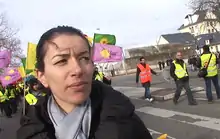Triple murder of Kurdish activists in Paris
Fidan Doğan, Sakine Cansiz and Leyla Şaylemez, Kurdish militant members of the PKK, were assassinated by gunshots to the head during the night of 9–10 January 2013 in the 10th arrondissement of Paris.[1]
.jpg.webp)
Facts
During the night between Wednesday 9 and Thursday 10 January 2013, the bodies of Fidan Doğan, Sakine Cansız, co-founder of the Kurdistan Workers' Party (PKK) and Leyla Şaylemez – all three Kurdish women activists – were found in the premises of the Centre d'Information sur le Kurdistan located on 147 Rue La Fayette in Paris. Each of them were shot execution-style with several bullets in the head.[2]
Investigations
According to investigations by French authorities, it is possible that MİT (Turkey's National Intelligence Organization) is involved in the murders.[3] The suspected murderer, Ömer Güney, was a 34 year old Turkish maintenance employee at Paris Charles de Gaulle airport. Video cameras at the site of the murder show that he was inside the building between 00:11 and 00:56 when the deaths occurred. Gunpowder was found on his bag. Technical investigations were performed on his Nokia mobile phone and experts decrypted it and restored deleted files. They found images taken the day before (January 8) establishing that he was in the premises of a Kurdish association in Villers-le-Bel between 4:23 and 5:33 in the morning and took pictures of 329 memberships files. Two days before, he took pictures of accounting tracing alleged racketeering activity inside the Kurdish community.[4]
A few months after these murders, an audio recording between Ömer Güney and suspected MIT agents was released on the Internet.[5] Omer Güney also had hundreds of pictures of Kurdish activists in his mobile phone. Anti-terrorist judge Jeanne Duyé was in charge of investigations; in September 2013, her computer was stolen from her home in a burglary.[6] Ömer Güney was detained on the 21 January 2013. The French antiterror-unit Sdat found a passport with three stamps from journeys to Turkey behind the radio in a car he borrowed the day of the murder.[6]

The judge considered the involvement of Turkish secret services in the murder to be a possibility, but didn't establish who ordered the operation and if the murderer acted according to the will of the top management or not (in theory, this may have been an attempt to stall peace talks that were occurring between Ankara and the PKK at that time). On 13 December 2016, Ömer Güney was moved to a hospital for urgent care connected to his brain tumor and he died the next day, five weeks before the scheduled start of his trial.[7][8]
Shortly after Güney died, France decided to close the investigation into the murders.[9] In May 2019 the investigation was reopened.[10]
Eyyup Doru, a representative of the Peoples' Democratic Party (HDP) speculated that the primary target of the triple assassination might have been Fidan Doğan because of her social and political connections in France.[11] Lawyer Sylvie Boitel explained that this young woman was very clever and had three cultures: French, Turkish and Kurdish. One of brothers said that she met French President François Hollande several times when he was leader of the Socialist Party[12] and had active relationships with French authorities.
Metin, the brother of Sakine Cansiz, says that France is responsible because she was killed in France and the murderer died in jail before trial.[13]
Book
"Triple Assassinat au 147, Rue Lafayette" is a book by Laure Marchand, who spent three years investigating the murders and links with the Turkish secret services. It outlines the biographies of the three young women and discusses the politics of Turkish President Recep Tayyip Erdoğan.[14]
References
- Le monde 2013
- Avec AFP (11 January 2013). "Les trois militantes kurdes ont été assassinées de plusieurs balles dans la tête"..
- "Assassinat de militantes kurdes à Paris : la justice souligne l'implication des services secrets turcs". 23 July 2015. Retrieved 6 April 2016.
- http://www.lexpress.fr/actualite/societe/fait-divers/kurdes-assassinees-la-piste-politique_1312649.html
- Diehl, Jörg; Gezer, Özlem; Schmid, Fidelius (2014-02-10). "GEHEIMDIENSTE: "Und Gott bewahre"". Spiegel Online. 7. Retrieved 2019-05-31.
- "Insight: French investigation into Kurdish murders eyes Turkey..." Reuters. 2013-10-23. Retrieved 2019-05-30.
- « Omer Güney, assassin présumé de trois militantes kurdes à Paris, meurt avant son procès », 20minutes.fr, accessed date 17 december 2016.
- "Militantes kurdes assassinées à Paris : le suspect renvoyé devant les assises". leparisien.fr (in French). 2015-08-13. Retrieved 2020-10-28.
- "France reopens probe into killing of 3 Kurdish activists". France 24. 2019-05-15. Retrieved 2019-05-31.
- "France reopens inquiry into 2013 murder of Kurdish militants". Reuters. 2019-05-16. Retrieved 2019-05-31.
- Ariane Bonzon (2017-01-11). "L'impossible vérité sur l'assassinat de trois Kurdes à Paris". www.slate.fr (in French). Retrieved 2020-03-28.
- à 07h00, Le 16 janvier 2013 (2013-01-16). "Le frère d'une des Kurdes témoigne". leparisien.fr (in French). Retrieved 2019-07-27.
- , slate.fr, on 11 January 2017
- parismatch.com//Retour-sur-l-assassinat-de-trois-militantes-kurdes-a-Paris-